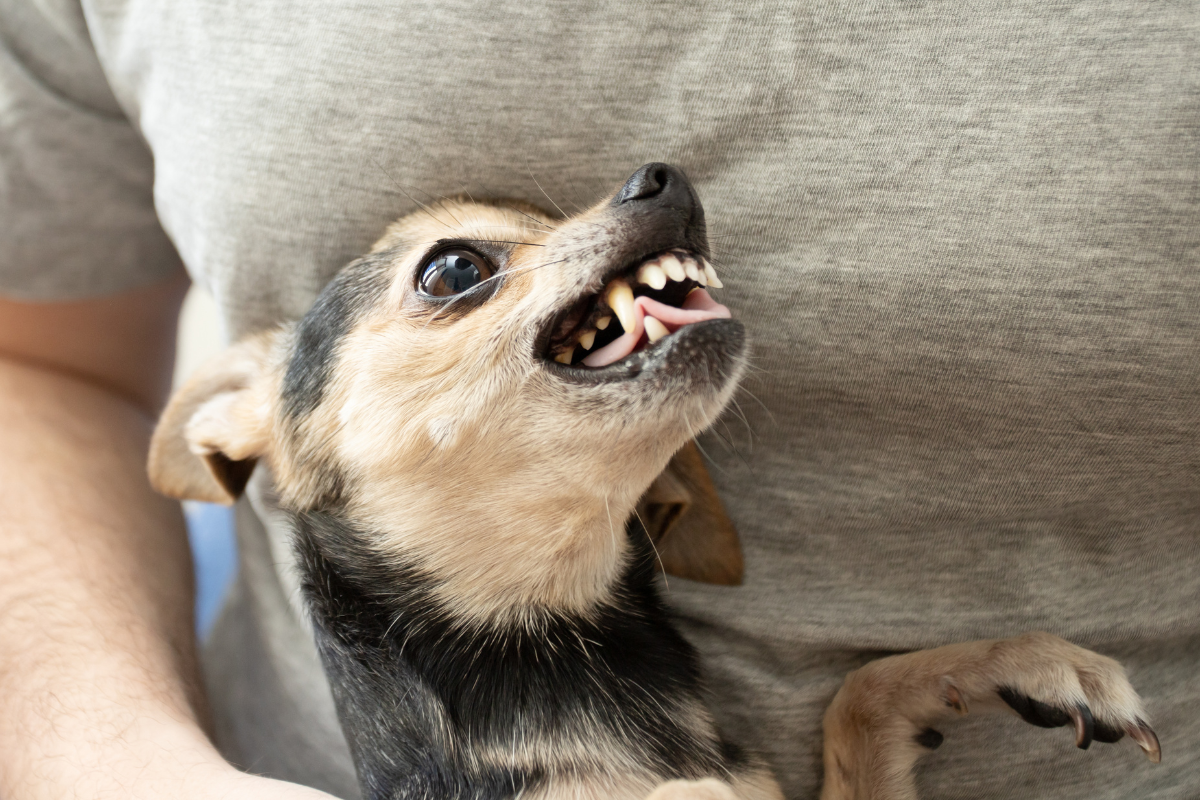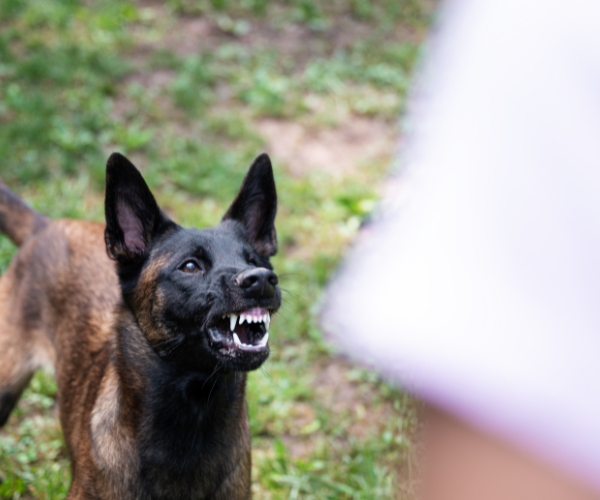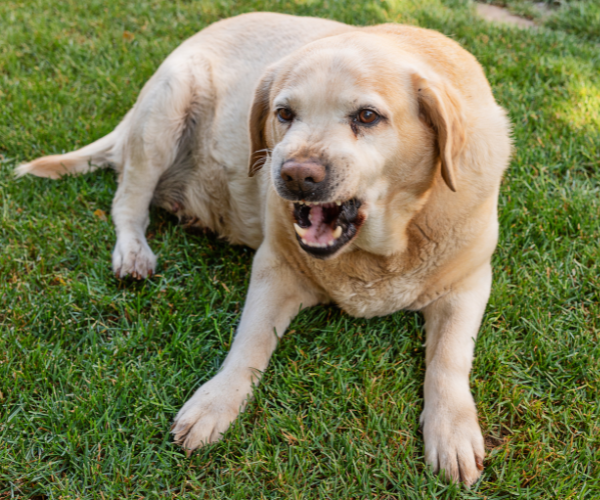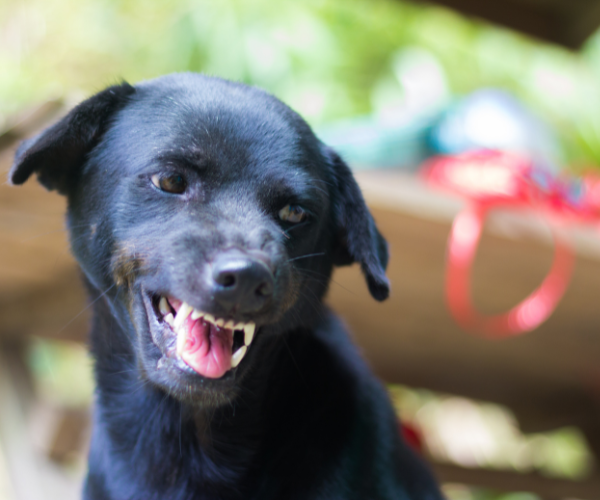Why Is My Dog Growling When I Pick It Up? Answered!
Why Is My Dog Growling When I Pick It Up? Answered!

Vet Reviewed

By: Sarah Hodgson
January 20, 2024
Table of Contents
It can be concerning and confusing when your dog growls at you when you try to pick them up. Is it a sign of aggression, what are they trying to say?
In this article, we will explore the reasons why dogs growl when being picked up and provide some helpful tips on how to address this behavior of theirs.
Let's dive in!
Communication
Dogs communicate through various body language and vocalizations, and growling is one way they express their emotions. When it comes to dogs, all dogs growl. Whether its the German Shepard or Labrador or even the Great Pyrenees.
When a dog growls when being picked up, it is important to understand that they are trying to communicate something to you. It could be a sign of pain, discomfort, fear, or even dominance.
Reasons Why Your Dog Growls When Being Picked Up
Pain or Discomfort
One reason why a dog may growl when being picked up is because they are experiencing pain or discomfort. It could be due to an injury, arthritis, or any other medical condition. When you lift them, it puts pressure on their body, which exacerbates their discomfort, leading to growling. It is crucial to take your dog to the veterinarian to rule out any underlying health issues and provide appropriate treatment.

Sign of Dominance
In some cases, growling when being picked up can be a sign of dominance. Dogs are pack animals, and in their natural hierarchy, dominant dogs exert control over submissive ones. When you try to lift your dog, they may perceive it as an attempt to assert dominance over them, triggering their growling response. This behavior is more common in dogs with strong personalities or those who have not been properly socialized.
Feel Anxious or Fearful
Anxiety and fear can also be underlying reasons for a dog's growling when being picked up. Some dogs may feel anxious or fearful due to past traumatic experiences or a lack of socialization. They may associate being lifted with a negative experience or anticipate discomfort, leading to their defensive response. It is essential to create a safe and positive environment for your dog, gradually desensitizing them to being picked up through positive reinforcement and reward-based training.
Not Used To Being Touched
Dogs that are not used to being touched or handled may growl when picked up. This could be due to a lack of early socialization or limited exposure to different types of touch. If your dog was not properly socialized as a puppy, they may find being lifted and held as a foreign and uncomfortable experience. Patience and gentle handling, along with positive reinforcement training, can help your dog overcome their aversion to being picked up.
Stem From a Traumatic Event
In some cases, a dog's growling when being picked up may stem from a traumatic event in their past. If your dog has experienced abuse, neglect, or a scary incident, they may associate being lifted with those negative memories. It is essential to approach your dog with empathy and patience, allowing them to gradually build trust and confidence. Consultation with a professional dog behaviorist or trainer may also be beneficial in such cases.
Is The Growling Early Signs of Aggression?
When it comes to growling it is a dog's way of communicating their discomfort or unease. It serves as a warning signal, indicating that the dog is unhappy with the current situation. However, this does not necessarily mean that the dog is aggressive or will escalate the behavior to actual aggression.
Growling is typically a warning signal that dogs use to communicate their discomfort or displeasure. It is their way of saying, "I am not comfortable with this situation." Ignoring or punishing your dog for growling can escalate the situation and potentially lead to more aggressive behavior.
If the growling is accompanied by other signs of aggression, such as bared teeth, raised hackles, or lunging, then it is important to look into it further and consult a certified dog behaviorist or trainer.

What To Do With a Dog That Doesn't Like To Be Picked Up
If your dog doesn't like to be picked up, then you should respect their boundaries and find alternative ways to interact with them.
Forcing or coercing your dog into being lifted can lead to increased anxiety and stress. Instead, focus on building trust and positive associations with being handled. Gradually introduce your dog to being lifted through desensitization exercises, using treats and praise to reinforce calm and relaxed behavior. It may also be helpful to consult with a professional dog trainer or behaviorist who can guide you through this process.
Should I Stop Picking Up My Dog?
If your dog consistently growls or shows signs of distress when being picked up, it may be best to avoid lifting them altogether. While there may be situations where lifting is necessary, such as for grooming or veterinary visits, it is important to find alternative methods that are less stressful for your dog.
For example, you can use a ramp or stairs to help them get in and out of the car or provide a comfortable and accessible space for them to rest without the need for lifting.
Should I Punish My Dog For Growling At Me?
Punishing your dog for growling is not recommended. Growling is a form of communication, and by punishing your dog, you are essentially punishing them for expressing their discomfort or fear. This can lead to suppressed warning signals, which may result in more severe behavioral issues down the line.
Instead, focus on addressing the underlying cause of the growling and providing positive reinforcement for calm and relaxed behavior. Consultation with a professional dog trainer or behaviorist can help you develop an appropriate training plan.

How to Get a Puppy to Stop Growling when You Pick Them Up
When it comes to addressing growling behavior early intervention is key. If your puppy growls when you pick them up, it is important to address it promptly to prevent it from becoming a habit.
Start by gently and gradually introducing your puppy to being lifted, using positive reinforcement and rewards for calm and relaxed behavior. It is also crucial to socialize your puppy to different types of touch and handling experiences from an early age, ensuring they feel comfortable and secure in your arms.
Here are some more ways that can help:
- Start with positive associations: Associate being picked up with positive experiences by offering treats, praise, and gentle petting before, during, and after lifting your puppy.
- Gradual desensitization: Gradually increase the duration and height of lifting your puppy, ensuring they remain calm and comfortable throughout the process. Take small steps and progress at a pace that your puppy is comfortable with.
- Practice proper handling: Ensure that you are lifting your puppy in a secure and supportive manner, providing them with a sense of safety and stability. Avoid any sudden or jerky movements that may startle or distress your puppy.
- Consistency and patience: Consistency is key when training your puppy. Practice lifting exercises regularly, maintaining a calm and patient demeanor. Over time, your puppy will learn to associate being picked up with positive experiences and will be less likely to growl.
Note
Remember, each puppy is unique, and it may take time and patience to help them overcome their fear or discomfort. If you encounter difficulties or your puppy's growling persists, consult with a professional dog trainer for additional guidance.
The Bottom Line
So there you have it, whether it is due to pain, dominance, anxiety, past trauma, or discomfort, it is crucial to approach your dog with empathy and patience.
Avoid punishing or coercing your dog and instead focus on positive reinforcement training and behavior modification techniques. If you are struggling to address the issue on your own, seeking guidance from a professional dog trainer or behaviorist can provide valuable insights and support.

Subscribe to Petfluence!
Get updates on the latest posts and more from Petfluence straight to your inbox.